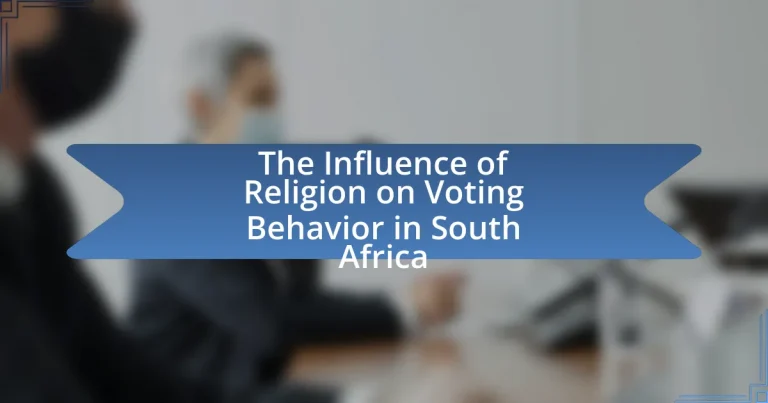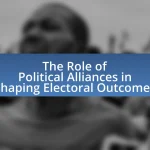The article examines the significant influence of religion on voting behavior in South Africa, highlighting how religious affiliation shapes political preferences and party loyalty among various demographic groups. It discusses the role of religious leaders in mobilizing congregations to vote, particularly during the 2019 national elections, and explores how religious teachings impact voter decisions on social issues. The article also outlines the major religions practiced in South Africa, their historical context, and the implications of religious identity on civic participation and electoral outcomes, emphasizing the complex interplay between faith and politics in shaping the country’s political landscape.
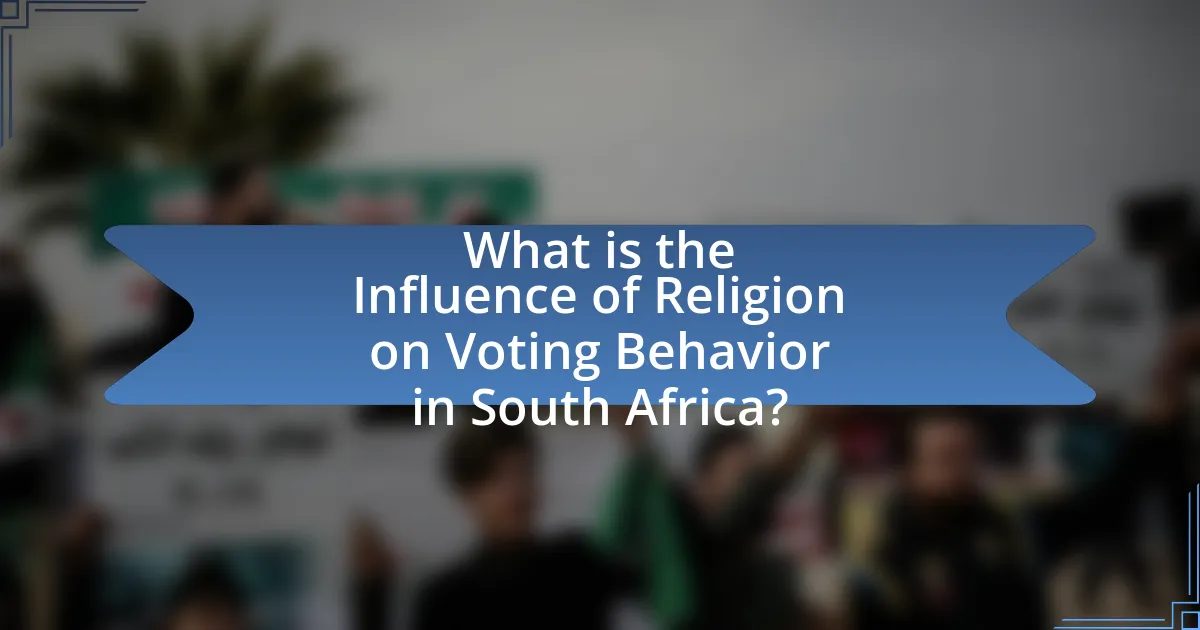
What is the Influence of Religion on Voting Behavior in South Africa?
Religion significantly influences voting behavior in South Africa, shaping the political preferences and affiliations of various demographic groups. For instance, research indicates that religious affiliation often correlates with party loyalty, where Christian voters, particularly those from evangelical backgrounds, tend to support parties that align with their moral values, such as the African Christian Democratic Party. Additionally, surveys show that religious leaders can mobilize congregations to vote, impacting electoral outcomes. The 2019 national elections highlighted this trend, as religious organizations actively encouraged voter participation, demonstrating the power of faith-based communities in the political landscape.
How does religion shape political beliefs in South Africa?
Religion significantly shapes political beliefs in South Africa by influencing moral values and community identity. The majority of South Africans identify with Christianity, which often informs their views on social issues such as marriage, education, and governance. For instance, religious leaders frequently engage in political discourse, advocating for policies aligned with their beliefs, which can sway congregants’ voting behavior. Additionally, studies indicate that religious affiliation correlates with party support; for example, the African Christian Democratic Party attracts voters who prioritize Christian values in politics. This interplay between faith and politics is evident in the active role of religious organizations in social justice movements, further solidifying their impact on political beliefs.
What are the major religions practiced in South Africa?
The major religions practiced in South Africa are Christianity, indigenous African religions, Islam, and Hinduism. Christianity is the predominant faith, with approximately 80% of the population identifying as Christian, reflecting a diverse range of denominations including Protestantism and Catholicism. Indigenous African religions are also significant, practiced by around 10% of the population, emphasizing ancestral worship and traditional beliefs. Islam accounts for about 1.5% of the population, primarily among the Cape Malay community, while Hinduism is practiced by approximately 1.2%, mainly within the Indian community. These religions influence social values and voting behavior, shaping political affiliations and community engagement in the country.
How do religious teachings influence voter decisions?
Religious teachings significantly influence voter decisions by shaping moral values and social norms that guide individuals’ political preferences. In South Africa, for example, religious beliefs often dictate views on issues such as social justice, family values, and community welfare, which in turn affect party alignment and candidate support. Research indicates that voters who actively engage with their religious communities are more likely to prioritize candidates who align with their faith-based values, as seen in the 2019 national elections where religious groups mobilized voters around specific issues like poverty alleviation and ethical governance.
Why is understanding this influence important for political analysis?
Understanding the influence of religion on voting behavior in South Africa is crucial for political analysis because it shapes voter preferences and party alignment. Religious beliefs often inform individuals’ values and priorities, which can significantly impact their political choices. For instance, studies have shown that religious affiliation correlates with specific voting patterns, such as higher support for parties that align with moral and ethical values derived from religious teachings. This relationship is evidenced by the 2019 national elections, where religious groups mobilized voters around issues like social justice and family values, demonstrating the tangible effects of religious influence on electoral outcomes. Analyzing this influence allows political analysts to predict voting trends and understand the broader socio-political landscape in South Africa.
What historical context is relevant to religion and politics in South Africa?
The historical context relevant to religion and politics in South Africa includes the intertwining of religious institutions with the anti-apartheid movement and the subsequent role of religion in shaping post-apartheid governance. During apartheid, many religious groups, particularly within the African National Congress (ANC) and the South African Council of Churches, actively opposed the oppressive regime, advocating for social justice and equality. This activism was rooted in a theological framework that emphasized human dignity and liberation, influencing political discourse and mobilization. After the end of apartheid in 1994, religious organizations continued to play a significant role in politics, contributing to nation-building efforts and addressing social issues, such as poverty and inequality, which remain prevalent in South Africa. The legacy of these historical interactions between religion and politics continues to impact voting behavior, as many citizens align their political choices with their religious beliefs and values.
How does this influence affect electoral outcomes?
The influence of religion significantly affects electoral outcomes in South Africa by shaping voter preferences and party alignment. Religious affiliations often guide individuals’ values and beliefs, which in turn influence their political choices. For instance, studies have shown that religious groups, such as the African Independent Churches, tend to support specific political parties that align with their moral and social values, impacting the overall voting patterns in elections. Additionally, the 2019 national elections revealed that approximately 80% of South Africans identify with a religious group, indicating that religious identity plays a crucial role in determining electoral behavior and outcomes.
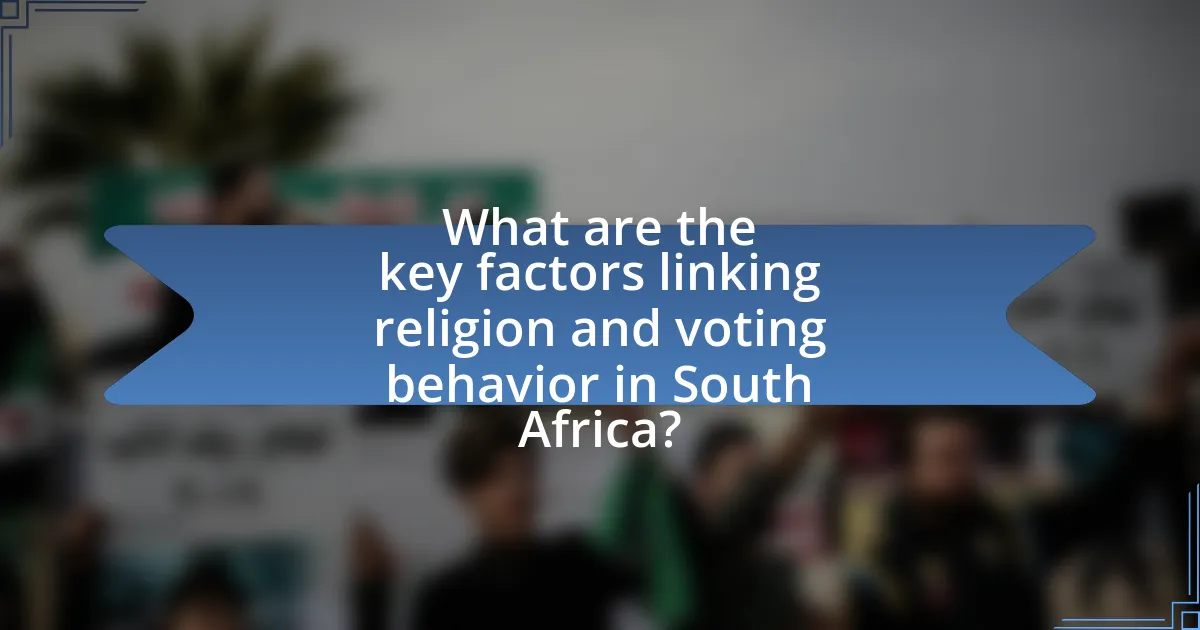
What are the key factors linking religion and voting behavior in South Africa?
The key factors linking religion and voting behavior in South Africa include the influence of religious affiliation, the role of religious leaders, and the impact of religious values on political preferences. Religious affiliation significantly shapes voters’ choices, as different faith communities often align with specific political parties that reflect their beliefs and values. For instance, the African Christian Democratic Party attracts voters from conservative Christian backgrounds, while the African National Congress resonates with more progressive religious groups.
Additionally, religious leaders play a crucial role in guiding their congregations’ political views, often endorsing candidates or parties that align with their moral and ethical teachings. This endorsement can sway the voting behavior of their followers, as seen in various elections where church leaders mobilized their communities to vote in a particular direction.
Furthermore, religious values, such as social justice, community welfare, and moral governance, influence voters’ perceptions of political candidates and parties. Research indicates that voters who prioritize these values are more likely to support parties that advocate for policies aligned with their religious beliefs. For example, the emphasis on social justice in many religious teachings has led to increased support for parties that focus on poverty alleviation and equality.
These factors collectively illustrate the complex interplay between religion and voting behavior in South Africa, demonstrating how faith shapes political landscapes and electoral outcomes.
How do religious affiliations correlate with political party support?
Religious affiliations significantly influence political party support in South Africa, with different faith groups aligning with specific parties. For instance, African Independent Churches tend to support the African National Congress (ANC), while more conservative religious groups, such as Evangelicals, often lean towards the Democratic Alliance (DA). Research by the Pew Research Center indicates that religious beliefs shape political attitudes, with 70% of South African Christians expressing a preference for parties that align with their moral values. This correlation is evident in voting patterns, where religious identity plays a crucial role in determining electoral outcomes.
What trends can be observed in voting patterns among different religious groups?
Voting patterns among different religious groups in South Africa reveal significant trends influenced by faith affiliations. For instance, African Independent Churches tend to support the African National Congress (ANC), reflecting a historical alignment with liberation movements. In contrast, more conservative religious groups, such as Evangelicals, often lean towards the Democratic Alliance (DA), indicating a preference for policies that align with their values. Additionally, Muslim voters have shown increasing political engagement, often favoring parties that address social justice and economic issues. These trends are supported by data from the 2019 national elections, where the ANC received approximately 60% of the vote from religious groups, while the DA garnered around 25% from Evangelicals, illustrating the distinct voting behaviors shaped by religious identity.
How do religious leaders impact their congregations’ voting behavior?
Religious leaders significantly influence their congregations’ voting behavior by shaping moral perspectives and political attitudes. They often deliver sermons that address social and political issues, encouraging followers to align their voting choices with religious values. For instance, studies have shown that in South Africa, religious leaders can mobilize voters by framing political discussions around ethical considerations, such as justice and equality, which resonate deeply with their congregations. This mobilization is evident in the 2019 South African elections, where religious organizations actively encouraged voter participation, emphasizing the moral obligation to vote.
What role does religious identity play in shaping political engagement?
Religious identity significantly influences political engagement by shaping individuals’ values, beliefs, and behaviors related to civic participation. In South Africa, for instance, religious groups often mobilize their congregations around specific political issues, leading to increased voter turnout and advocacy for policies aligned with their faith. Research indicates that individuals who identify strongly with their religion are more likely to engage in political activities, such as voting and campaigning, as their religious beliefs often dictate their views on social justice, morality, and community welfare. A study by the Pew Research Center found that religious affiliation correlates with political preferences, demonstrating that religious identity can serve as a powerful motivator for political action and engagement in the South African context.
How does religious identity influence voter turnout?
Religious identity significantly influences voter turnout in South Africa by shaping individuals’ values and political engagement. Studies indicate that individuals who identify strongly with a religion are more likely to participate in elections, as their beliefs often align with specific political ideologies or parties. For instance, research conducted by the Pew Research Center shows that religious groups in South Africa, such as Christians and Muslims, exhibit higher voter turnout rates compared to non-religious individuals, with Christians participating at rates exceeding 70% in recent elections. This correlation suggests that religious identity not only motivates civic duty but also fosters community mobilization, leading to increased electoral participation.
What are the implications of religious identity on civic participation?
Religious identity significantly influences civic participation by shaping individuals’ values, beliefs, and social networks. In South Africa, for instance, religious groups often mobilize their members to engage in political activities, such as voting and community service, reflecting their collective moral and ethical stances. Research indicates that individuals who identify strongly with a religious community are more likely to participate in civic activities, as these communities provide a platform for political discussion and action. A study by the Pew Research Center found that religiously active individuals tend to vote at higher rates compared to their non-religious counterparts, demonstrating the direct correlation between religious identity and civic engagement.
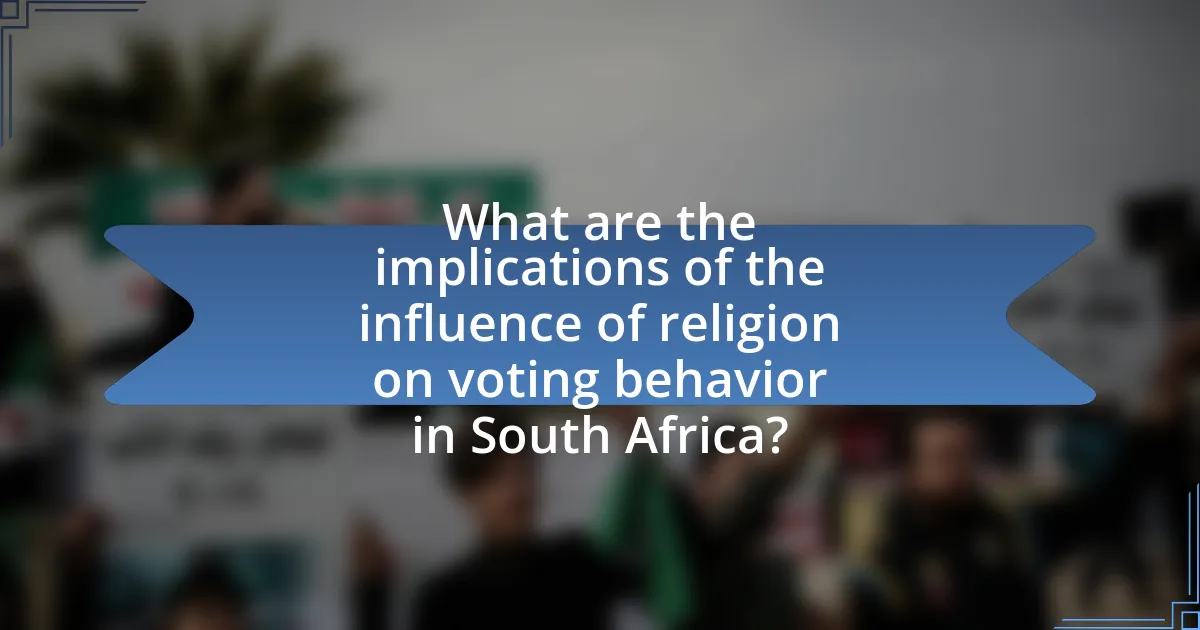
What are the implications of the influence of religion on voting behavior in South Africa?
The influence of religion on voting behavior in South Africa significantly shapes electoral outcomes and party alignment. Religious affiliations often dictate voter preferences, with many individuals aligning their political choices with the values and teachings of their faith communities. For instance, the African Christian Democratic Party (ACDP) attracts voters who prioritize Christian values, while the Economic Freedom Fighters (EFF) may appeal to those seeking social justice, regardless of religious affiliation.
Research indicates that approximately 80% of South Africans identify as religious, which underscores the potential for religious leaders to mobilize voters and sway public opinion during elections. This mobilization can lead to increased voter turnout among specific religious groups, thereby influencing the overall electoral landscape. Additionally, religious institutions often engage in political discourse, advocating for policies that resonate with their congregations, further intertwining faith with political behavior.
How can political parties leverage religious influence in their campaigns?
Political parties can leverage religious influence in their campaigns by aligning their messages and policies with the values and beliefs of religious communities. This alignment can enhance voter engagement and mobilization, as religious groups often have established networks that can facilitate outreach. For instance, in South Africa, political parties have historically engaged with religious leaders and organizations to gain credibility and support, as seen during the 2019 elections when parties like the African National Congress collaborated with church leaders to address social issues. This strategy is effective because religious institutions often hold significant sway over their congregants’ voting behaviors, as evidenced by studies indicating that religious affiliation can strongly correlate with political preferences in the region.
What strategies have been successful in engaging religious communities?
Successful strategies for engaging religious communities include fostering interfaith dialogue, leveraging community leaders, and addressing social issues relevant to the community. Interfaith dialogue promotes understanding and collaboration among different religious groups, which can enhance participation in civic activities. Engaging community leaders, such as pastors or imams, helps to mobilize congregations effectively, as these leaders often hold significant influence over their followers. Additionally, addressing social issues like poverty, education, and health care resonates with religious communities, encouraging them to participate in initiatives that align with their values. These strategies have been validated by studies showing increased voter turnout and community involvement when religious organizations actively engage in social and political discourse.
How do religious values align with political platforms?
Religious values significantly align with political platforms by influencing the moral and ethical frameworks that guide political decision-making. In South Africa, for instance, many political parties incorporate religious principles into their platforms, reflecting the beliefs of their constituents. The African National Congress (ANC) often emphasizes social justice and equality, which resonate with Christian teachings on compassion and community support. Conversely, parties like the Economic Freedom Fighters (EFF) may appeal to religious sentiments by advocating for the rights of marginalized groups, aligning with the religious call for justice and equity. This alignment is evident in voter behavior, as individuals often choose political parties that reflect their religious values, thereby shaping the political landscape in South Africa.
What challenges arise from the intersection of religion and politics?
The intersection of religion and politics presents challenges such as the potential for conflict between differing belief systems and the risk of marginalizing secular viewpoints. In South Africa, where diverse religious beliefs coexist, political parties may align with specific religious groups to gain support, leading to policies that favor certain ideologies over others. This can create societal divisions and exacerbate tensions among communities. Additionally, the intertwining of religious authority with political power can undermine democratic principles, as seen in instances where religious leaders influence legislation or electoral outcomes, potentially compromising the separation of church and state.
How can political polarization be addressed in a religiously diverse society?
Political polarization in a religiously diverse society can be addressed through interfaith dialogue and inclusive policymaking. Interfaith dialogue fosters understanding and respect among different religious groups, reducing misconceptions and hostility. For instance, initiatives like the South African Council of Churches promote collaboration among various faiths, encouraging shared values and collective action on social issues. Inclusive policymaking ensures that diverse religious perspectives are represented in political decisions, which can mitigate feelings of alienation among minority groups. Research indicates that societies with higher levels of intergroup contact experience lower levels of polarization, highlighting the effectiveness of these approaches in creating a more cohesive political environment.
What are the risks of politicizing religious beliefs?
Politicizing religious beliefs poses significant risks, including the potential for social division and conflict. When religious ideologies are intertwined with political agendas, it can lead to polarization among different groups, fostering an environment of intolerance and hostility. Historical examples, such as the sectarian violence in Northern Ireland, illustrate how politicized religion can escalate into violent conflict, undermining social cohesion. Additionally, the manipulation of religious sentiments for political gain can distort public discourse, leading to policies that may not reflect the broader population’s needs or values. In South Africa, where diverse religious beliefs coexist, politicizing these beliefs could exacerbate existing tensions and hinder democratic processes.
What best practices can be adopted for respectful political discourse among religious groups?
Best practices for respectful political discourse among religious groups include fostering open dialogue, emphasizing shared values, and promoting active listening. Open dialogue allows individuals from different religious backgrounds to express their views without fear of judgment, which can lead to greater understanding. Emphasizing shared values, such as compassion and justice, helps to create common ground, making discussions more constructive. Active listening encourages participants to genuinely consider opposing viewpoints, reducing hostility and fostering a more respectful environment. These practices are essential in a diverse society like South Africa, where religious beliefs significantly influence voting behavior and community dynamics.
